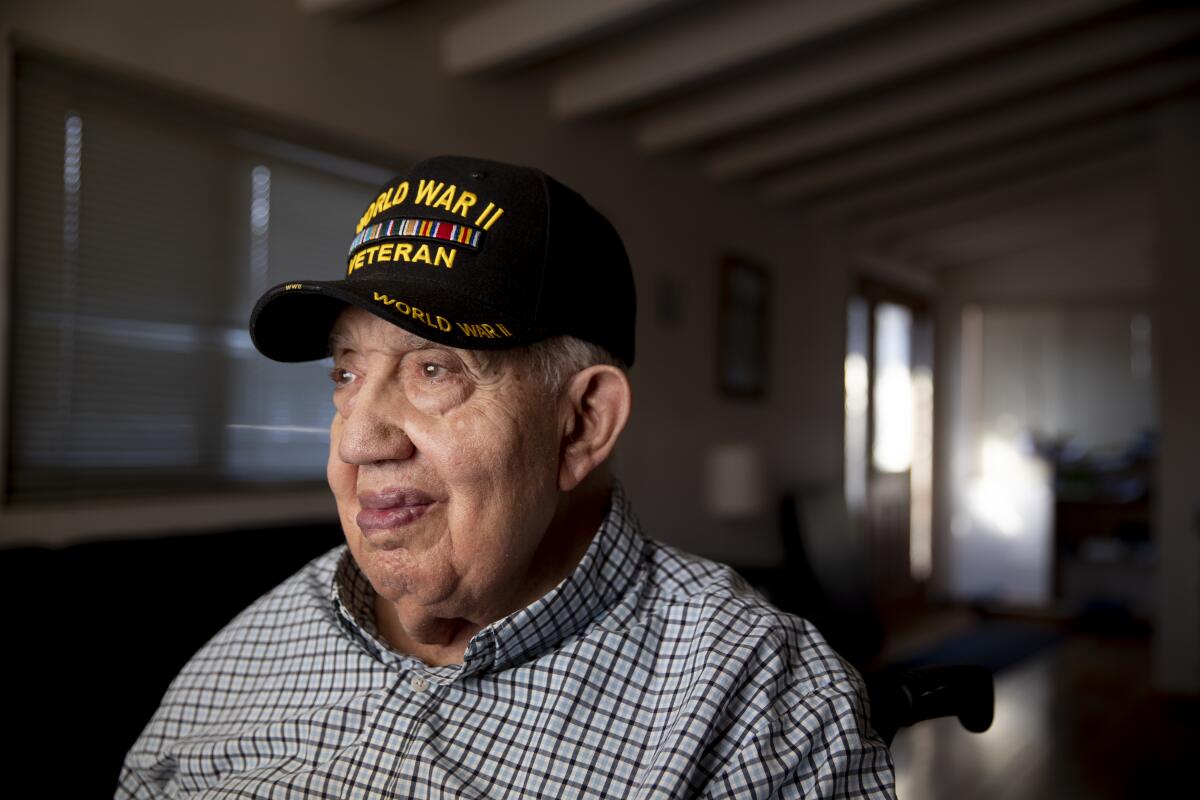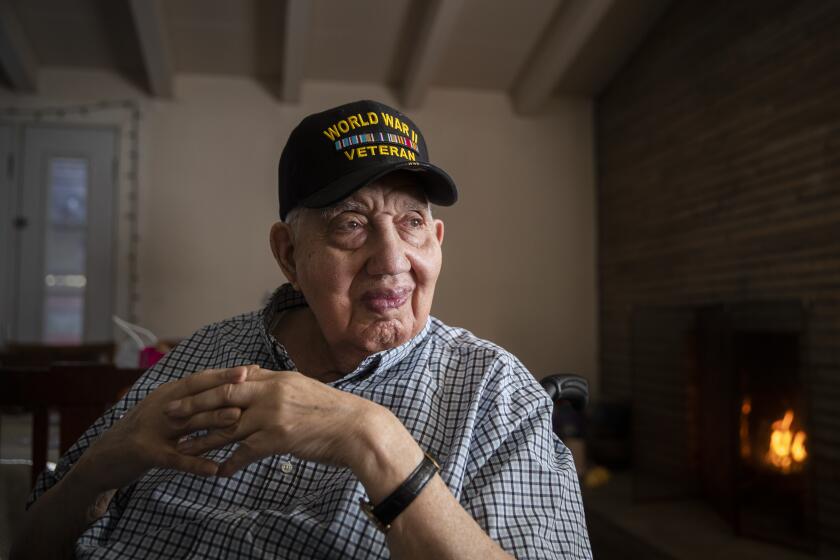Aerospace engineer and Black WWII veteran falsely labeled a mutineer dies at 101

- Share via
Bernard Benedict James sat his young children down in the family living room decades ago in their La Mirada home, where he’d written a set of math equations on a blackboard.
The Harvard-educated aerospace engineer was working for NASA’s Jet Propulsion Laboratory at the time and wanted to give his 10 children an impromptu lecture on mathematics.
“I was just learning about fractions in primary school, and my dad started to put up math about black holes,” his son David, now a 59-year-old visual effects artist, said this week.
But before the math lessons, and before James worked on two missions that sent astronauts into space, the World War II veteran spent two years in prison after hastily being convicted of mutiny and insubordination, a Black soldier who dared question a white superior officer.
James and his family worked tirelessly over the ensuing decades to clear his name, but he did not live long enough to see a full correction to his service record. James died in his sleep July 18 at the La Mirada home where he once tutored his children. He was 101.
Bernard Benedict James helped launch America into space in the 1960s and turned 101 earlier this month.
James should have been part of the U.S. forces that invaded the beaches of Normandy, France, for D-day in June 1944. Instead he sat in an English prison after a hasty Army court-martial.
He had spoken up on behalf of another soldier who had fallen in the verbal crosshairs of a white commanding officer, one who often shouted racist remarks at the men in the segregated 641st Ordnance Company and labeled its Black soldiers with the N-word. For his loyalty, James was told to “remove his stripes,” according to court transcripts. Several other men turned theirs in as well in protest.
Two months later, military police officers with submachine guns swarmed the camp and arrested James and 17 other soldiers, all of them Black.
James was sentenced to 18 years in prison but was unceremoniously released two years later without a formal apology after his family began a letter-writing campaign to bring attention to his case.
“I didn’t know that people were thinking of me,” James said earlier this year. “My sister and family and even my future wife, Florence, were all working on my behalf, our behalf. It was a lesson for sure. I would think about all of that for years and years later.”
After he was released from prison, James returned to his Army service and was honorably discharged in 1947, but his record maintained he was AWOL for 704 days — even though that time was spent in prison.
The U.S. Army provided James a partial correction to his military record after The Times wrote about him on his last birthday. David said his father wanted to appeal the Army’s decision; he wanted a full correction to his record explaining he was falsely imprisoned. California Assembly member Cristina Garcia introduced a joint resolution in March seeking a full presidential exoneration of James’ record.
While the Army acknowledged that James did not desert his post while serving in the military, nobody ever called to apologize, he told The Times in April.
“I’m not holding my breath,” James said at the time.
Remembering those who died in 2022, including L.A. legend Vin Scully, actors Ray Liotta and Paul Sorvino, and musicians Loretta Lynn and Meatloaf.
Bernard Benedict James was born Feb. 7, 1921, in St. Louis and spent his formative years in Chicago. His mother’s Creole family came to the United States from Haiti; his father was half-Black and a quarter Cherokee.
James attended the Illinois Institute of Technology and Wilson Junior College in Chicago and worked as a junior engineer draftsman. But in 1943, in the thick of World War II, the Army drafted James, who served as a technician in the European Theater.
Josefa James, 67, doesn’t think her father suffered from PTSD but said there were bouts of anger that flared up during her childhood that she couldn’t comprehend at the time.
“I think it had to do with his his time in prison. Once they had imprisoned him during the Army, I think he was always leery that the government could impose their will on you and you’d have nothing to do about it,” said Josefa, who worked as a prosecutor for 30 years in Alameda County.
After leaving the Army, James went back to school, first at the University of Michigan and later at Harvard University. He married Florence, a white journalist he met through the Friendship House, a faith-based organization that advocated for civil rights in Chicago.
“The smartest thing my father did was marry my mother,” said son Will James, a U.S. history teacher, adding that his mother went back to school after raising 10 children and got her master’s degree in library science.
James would go on to an illustrious career in the aerospace industry — including designing the capsules that carried astronauts on the Apollo and Mercury space missions.
After his work landed the family in Southern California, they often took their two station wagons on fishing trips to Mexico when the kids were little. During those road trips, Josefa said, her father occasionally let her drive, and the two would launch into meaningful conversation. In such a large family, she relished that one-on-one time.
James was a skilled fencer and chess player, Josefa said, and taught her how to recognize the constellations and shoot a bow and arrow when she was a child.
She said a friend once described the James family dynamic like so: “Your mother’s in a rowboat, back straight. All 10 of you are in the boat, and she’s rowing, while your father is swimming in the ocean around her,” Josefa said. “And that was my father.”
He once vowed to fish from the ocean for all of his family’s meals. And when he wasn’t fishing, James enjoyed cooking duck gumbo and other haute cuisine while celebrating his family’s Creole culture. He often peppered his stories with French and Spanish.
“Whenever my friends would come over during high school, they would enjoy all the conversations that were going on because my father always had some type of answer to our questions,” recalled son Will, 66.
While race was not openly talked about in the family home, the James children were not shielded from bigotry.
Daughter Maria-Elena James, 68, remembered how in 1962, her father invited Walter Schirra, a personal friend of his and the first astronaut to go into space three times, to his children’s school.
“At the time, La Mirada was almost all white,” Maria-Elena, 68, recalled. “I was sitting there proudly beaming as my father was in front of the auditorium with a model of the rocket ship and a famous astronaut.”
Then a boy in front of her turned around and called her father the N-word. She punched him in the mouth.
“I got sent home for fighting. I got into five fights that day,” said Maria-Elena, who spent her career as a federal magistrate judge. “They didn’t appreciate the astronaut, but they did appreciate that my father was Black.”
David recalled being on a family trip outside California in the 1960s and his father not being served at a restaurant.
“I was very young at the time,” he said. “It was a strange thing to come to the realization of how others saw him just as a Black person versus this very well-educated polylingual scientist.”
David said his father tried to brush off racism whenever it confronted him and sought instead to celebrate the big coincidences in life.
James believed, instead, in the concept of fors, the Latin word for luck or chance. He believed nothing was ever really a coincidence.
Cherice Fraine met James when she was in her early 20s and working in the Macy’s shoe section while attending community college in Fullerton.
“I must have had a sour look on my face because he asked me what was wrong,” Fraine recalled in February.
She told James she was studying for a statistics class and it was important for her to pass so she could transfer to a four-year university.
“He explained that he was a bit of a mathematician. I didn’t know he was an engineer. He offered to tutor me, and I didn’t know what to think,” said Fraine, 41. She accepted, and his tutoring helped her pass the class.
She now works as an analyst for the U.S. government, a career she says would not have been possible without James.
James was preceded in death by his wife of 64 years, Florence Fitzgerald James, and a son, Christopher James. He is survived by a brother, Andrew James; nine children — Frank James, Anthony James, Maria-Elena James, Josefa James, William James, Beatrice James, Philip James, David P.I. James, Isabel James — and four grandchildren: Ryan Quitzow-James, Ivan James, James Brandon and Ellen James.
More to Read
Sign up for Essential California
The most important California stories and recommendations in your inbox every morning.
You may occasionally receive promotional content from the Los Angeles Times.













